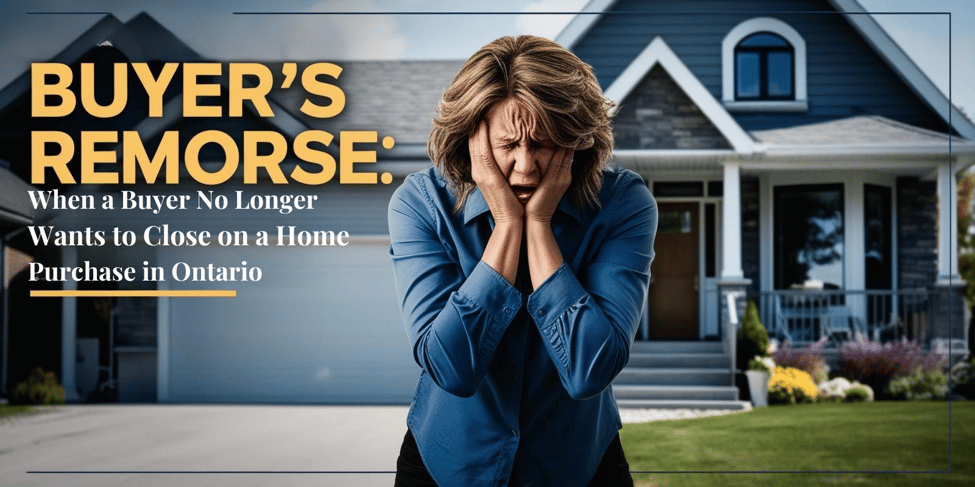Imagine this: You’ve just bought your dream home in Ontario. The offer was firm. The deposit? Down. But instead of popping champagne, you’re panicking.
You’re not alone—over 60% of homeowners experience buyer’s remorse. Whether it’s cold feet, financial fears, or late-night Realtor.ca surfing, regret can sneak in fast. And once that Agreement of Purchase and Sale is signed? Backing out isn’t just messy—it can be legally and financially brutal.
Buying a home is one of the biggest financial decisions a person can make. It’s an exciting yet nerve-wracking process, filled with emotions, paperwork, and commitment. But what happens when a buyer gets cold feet? ❄️🚶♂️
In Ontario, once a buyer has signed an Agreement of Purchase and Sale (APS), they are legally obligated to close the deal. However, real estate transactions don’t always go as planned. Buyer’s remorse can strike, and some buyers try to back out—leaving sellers in a difficult situation.
So, what can be done when a buyer wants to walk away from a firm deal? 🧐 Let’s dive into a real-life scenario, possible solutions, legal options for sellers, and why hiring an experienced realtor is crucial to preventing such costly situations.
📍 Real-Life Scenario: Mario and Anna from Woodbridge Face Buyer’s Remorse
Mario and Anna, a married couple from Woodbridge, had been looking for their dream home for months. They were frustrated with bidding wars, competing offers, and rising prices. Then, one day, they found it—a stunning 4-bedroom detached home listed for $1.3 million. It was perfect! 🎉
They didn’t want to lose out, so they submitted a firm offer with no conditions and a $50,000 deposit to make their bid more attractive. The sellers accepted, and the deal was done. 📝✅
But as the closing date approached, panic set in.
🔹 They realized their monthly mortgage payments would be higher than they expected due to an interest rate increase. 📈
🔹 Their financing wasn’t fully secured—their lender had pre-approved them but needed additional documentation. 💰
🔹 Anna got cold feet, wondering if they were making a mistake. She started browsing homes online again. 😬
Feeling overwhelmed, they called their realtor:
“We don’t think we can go through with this. Can we back out of the deal?” 😨
This put the sellers in a tough spot—they had already purchased their next home and were relying on the proceeds from this sale. Now, they faced the possibility of a failed deal and financial loss.
🛑 What Can a Buyer Do If They Want to Back Out?
1️⃣ Try to Negotiate an Exit (Highly Unlikely)
Mario and Anna could ask the sellers to mutually cancel the agreement, but most sellers won’t agree unless they have another strong buyer lined up. Why? Because they could end up selling for less or having their own moving plans disrupted. 🚪⛔
2️⃣ Assign the Contract to Another Buyer
If allowed by the contract, the buyer might try to assign the agreement to someone else before closing. This means finding another buyer to take over the deal. However, in a cooling market, this is easier said than done. 🤦♀️
3️⃣ Forfeit Their Deposit (But It’s Not That Simple)
Some buyers think, “I’ll just walk away and lose my deposit.” But in Ontario, deposits are held in trust and cannot be automatically released to the seller unless both parties agree. If the seller suffers financial losses, they can sue for additional damages. 🚨⚖️
⚖️ What Can a Seller Do If the Buyer Refuses to Close?
If a buyer refuses to close, the seller has legal rights and options to minimize financial damage. Here’s what they can do:
1️⃣ Keep the Deposit (If Allowed)
The first step is to retain the buyer’s deposit, but this requires legal action if the buyer does not agree to release it.
Deposits serve as financial security for sellers, but they are not automatically handed over. If the buyer refuses to sign the mutual release, the matter may need to go to court. 👨⚖️
2️⃣ Sue for Financial Losses
If the seller re-lists the home and sells it for less than the original deal, they can sue the buyer for the difference.
For example:
💰 Mario and Anna agreed to buy for $1.3 million
💰 The seller re-lists and sells for $1.2 million
💰 The seller could sue Mario and Anna for $100,000 in damages, plus legal fees.
If the seller had to carry extra mortgage payments or other expenses due to the delay, those losses could also be claimed.
3️⃣ File a Lawsuit for Specific Performance
In rare cases, sellers can force the buyer to close through legal action. However, courts typically prefer monetary damages over forcing a sale.
4️⃣ Re-List the Home ASAP
If a deal falls through, time is of the essence. The seller should work with their realtor to get the home back on the market immediately to attract new buyers.
💡 Pro Tip: If the market has dropped, pricing the home competitively can help regain momentum and minimize losses.
📊 Real-World Financial Consequences of Buyer’s Remorse
Here’s a breakdown of the potential financial losses a seller could face when a buyer backs out:
 Loss Type Potential Cost
Loss Type Potential Cost
Deposit (if disputed) $50,000+
Selling for a lower price $50,000 - $200,000
Mortgage carrying costs $5,000 - $20,000
Legal fees $10,000 - $50,000
Extra moving/storage costs $2,000 - $10,000
Total Potential Losses $100,000+
For sellers, buyer’s remorse isn’t just an inconvenience—it can be a financial disaster. 🔥
🛠️ How to Prevent Buyer’s Remorse & Deal Failures
The best way to avoid this mess is by ensuring that buyers are serious, qualified, and financially prepared before they sign a firm contract.
🔍 A Good Realtor Will…
✅ Properly screen buyers to ensure they have secure financing.
✅ Encourage buyers to include necessary conditions if they have doubts.
✅ Educate buyers on market conditions so they feel confident in their decision.
✅ Help sellers assess risk when reviewing offers.
🛡️ Realtor Best Practices for Sellers
🔹 Ask for a larger deposit to ensure the buyer is committed.
🔹 Verify that the buyer has a mortgage pre-approval before accepting an offer.
🔹 Avoid waiving conditions unless the buyer is 100% prepared to close.
Unfortunately, some agents prioritize getting the deal signed over ensuring the buyer is truly ready. This is why it’s critical to work with an experienced realtor who protects your interests. 👏
💡 The Bottom Line: Buyer’s Remorse Isn’t Just a Feeling — It’s a Lawsuit Waiting to Happen
Buying or selling a home in Ontario isn’t like returning a sweater — there’s no receipt, no grace period, and definitely no “oops, changed my mind” clause. A firm deal is a legal contract, and backing out can cost tens of thousands in damages, legal fees, and stress wrinkles.
✅ Buyers: Before you sign on the dotted line, make sure your financing is rock solid, your heart’s in it, and you’re not just chasing a fantasy listing.
✅ Sellers: Vet your buyers like your future depends on it — because it might. And work with a realtor who knows how to spot red flags before they become courtroom drama.
📣 Ready to Close with Confidence?
If you're thinking of selling (or buying) and want to protect yourself from costly surprises, let’s talk.
💬 Book a free consult with The Ragona Sisters Real Estate Team — we don’t just close deals, we close smart.
Because regret has no place in your next move. 🏡💼🔑
💬 Worried about a deal falling apart? Download our "Closing With Confidence Checklist"—and if you're buying or selling, book a free 15-minute call with The Ragona Sisters to avoid costly missteps. Let’s make sure you move, not regret. 😉

